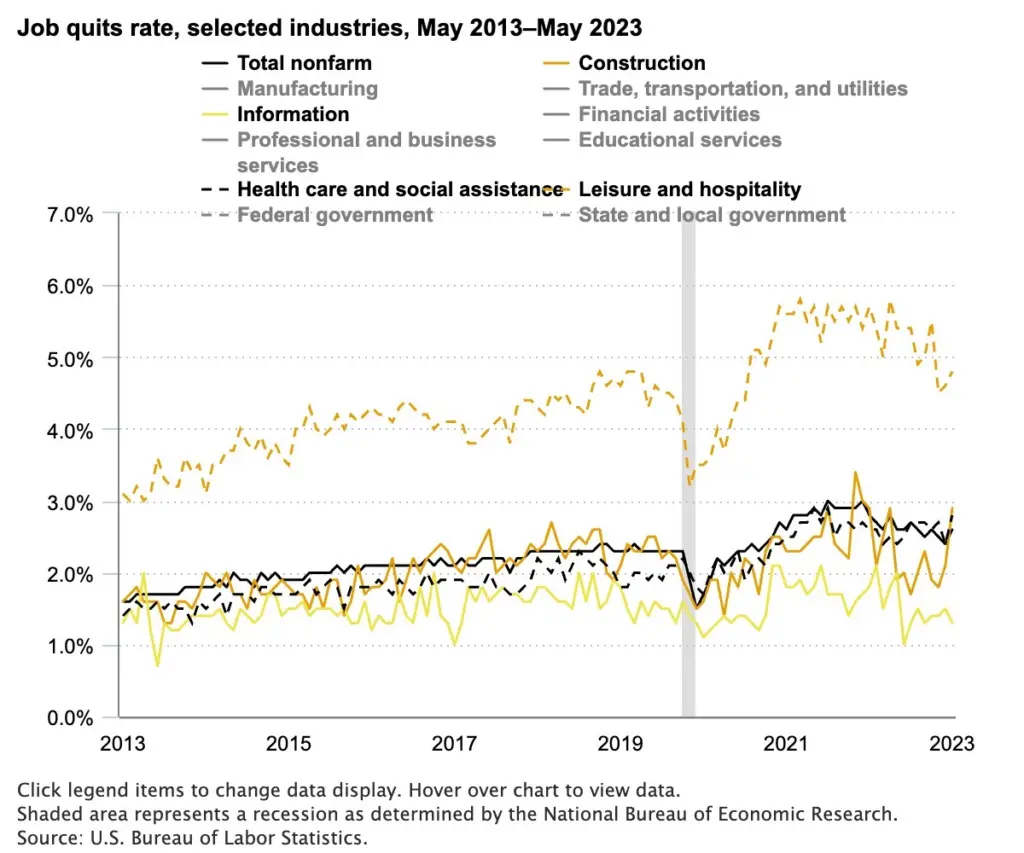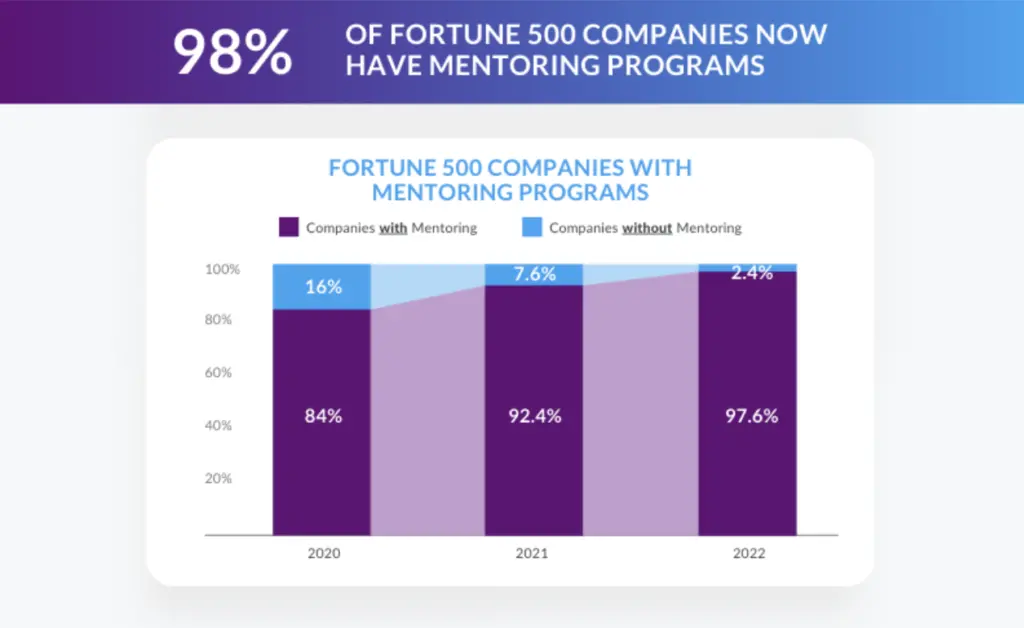“Employee retention” is one of the most feared phrases in an HR leader’s lexicon. Retaining employees is valuable for a myriad of reasons. It saves money. It improves company and team culture. It results in greater efficiency and creativity. Yet somehow, it’s still elusive and can often feel completely beyond your control. You’ll never be able to completely eliminate employee turnover, but you can reduce it significantly with specific engagement strategies. Key among them and proven to be effective is mentoring.
Mentoring increases employee retention by leveraging your most valuable resource: your employees.
We’re going to look at employee retention in two distinct ways as it relates to mentoring:
- Industry-level data: How does mentoring increase employee retention from a macro level?
- Company-level data: How does mentoring increase employee retention at a micro level?
By understanding how mentoring helps retain employees broadly and seeing what retention looks like on a smaller scale, you’ll have a better idea of how it can help your company increase employee retention, as well.
Take It With You:
Download our ebook on Why Employees Leave and how mentoring programs increase retention and save companies millions of dollars in turnover costs
Everyone’s Struggling with Employee Retention Right Now
Heads up: the retention struggles you’re dealing with right now are not just about you. Many companies are struggling to retain their employees right now. Still, those companies with mentoring programs are faring far better than companies that don’t have any mentoring programs in place at all.
First, what does the landscape look like?
According to the Bureau of Labor Statistics, the number of people quitting their jobs has “cooled” off compared to the pandemic. But that doesn’t mean they’re hitting historic lows. In fact, millions of employees are still quitting every month, with nearly 4 million employees handing in their two-week notices in June 2023 alone.

This is not without some precedent. Many employers are choosing to force a return-to-office, ending pandemic-era remote work that employees quickly enjoyed. Often, they do so without an ounce of data to back up the efficacy of that action, causing frustration among their workers.
This has led to worker backlash, likely inflating quit rates higher than they’d be otherwise.
We’re not talking about firings or lay-offs here. People left their current job to move on to other opportunities. What a nightmare for recruiting and hiring managers everywhere! To add another layer to this issue, millennials are currently the largest generation in the US labor force and, according to Gallup, have garnered a new nickname: the job-hopping generation.
Many people have one foot out the door right now for a variety of reasons. Return-to-office is just one of them. Employees are also feeling a lack of connection to their colleagues, limited support from management, and a strong desire to improve their skills and develop their careers. Meanwhile, many companies are laser-focused on reducing costs as much as possible at the expense of employee needs.
Instead, they’re playing chicken with uncertain economic headwinds, hoping that scares people into staying in their seats. Hint: It’s not working.
Macro-Level View: Employee Engagement and Mentoring Proves Valuable within the Fortune 500
In our 2024 Mentoring Impact Report, we looked at how mentoring plays in the mentoring landscape as it relates to the US Fortune 500. Within that cohort, we found:
- 98% of Fortune 500 companies now have mentoring programs
- Those with mentoring programs were more profitable than those without them
- The largest YoY increase in mentoring came not from companies new to the US Fortune 500 but those who remained on the list from the previous year.

Obviously, we’re not claiming that mentoring programs are the single source of better retention among Fortune 500 companies that have them. But they’re a critical pillar in the DNA of organizations that have discovered something special: supporting employee growth with structured employee engagement programs leads to better employee retention.
Micro-Level View: MentorcliQ Clients See Retention Improvements
Let’s assume it’s not 4 million millennials job-hopping each month and move on to the good news – mentoring relationships improve retention!
By cross-referencing MentorcliQ customers’ mentoring data and HRIS records, we found that employees who participate in mentoring programs have an average 9% turnover rate, while those not involved in mentoring have an average 19% turnover rate.
That means MentorcliQ’s clients see an average reduction in employee turnover by about 50%. That’s huge. Booking a demo will help you see exactly why MentorcliQ supercharges retention.
Social identity and self‐categorization theories state that a strong organizational identification is associated with low turnover intentions. Employees think and act on behalf of the group they belong to because this group membership adds to their social identity, which partly determines one’s self‐esteem.
This helps explain why 62% of employees with one to five work friends said they would reject a job offer; that increases to 70 percent for those with six or more friends at work. The tighter bond an employee has with their colleagues, the less likely they are to jump ship.
A well-aligned mentoring program increases employee retention by creating tighter bonds among seasoned employees and junior team members. With a new era of modern mentoring and advancements in mentoring software comes a multitude of great opportunities to increase employee retention through mentorship.
Many organizations today are offering open mentoring programs to help foster a mentoring culture. This lets employees know they are being invested in and supported. These programs are often available to all employees at the organization. This has been especially popular at organizations with lots of millennial employees, and rightly so; a 2016 study by Deloitte concluded that millennials planning to stay with their current employer for at least five years were twice as likely to have a mentor than not.
There are reasons, other than strict retention, to have these programs:
- They can be an effective way to promote an informal mentoring culture.
- They can focus on organizational improvement opportunities brought to light by engagement surveys and alleviate skills gaps.
In fact, the same Deloitte study found that 63% of millennials say their leadership skills are not being fully developed. Mentoring can help develop critical skills and create a more engaged workforce.
Why Mentoring Helps Make Employees Stay
We can talk all day long (and we really mean it) about how mentoring benefits not only just mentors and mentees but the entire workforce. But if we really have to cheery-pick and show you why mentorship actually works when it comes to employee retention, here they are!
Mentoring helps employees acquire new skills and knowledge
Mentoring plays a pivotal role in an employee’s professional development by providing a channel to gain new skills and knowledge specific to their field and beyond.
This direct transfer of expertise from the mentor to the mentee allows for a tailored learning experience that addresses individual weaknesses and builds on strengths. This setup not only helps in solving job-related challenges but also significantly enhances job performance. The proactive engagement in skill development fosters a deeper commitment to the organization, as employees recognize the investment in their personal and professional growth.
Mentoring boosts job satisfaction
Mentoring enriches the work experience by offering a supportive and nurturing relationship that extends beyond basic job training.
Mentors act as a sounding board, offering both professional guidance and personal support, which reaffirms the employee’s value to the organization. This support system enhances job satisfaction by making employees feel valued and understood, which in turn increases their engagement and positivity towards their work and workplace. The encouragement and recognition from a mentor can transform an ordinary job into a rewarding career.
Mentoring opens avenues for growth
Mentors serve as invaluable resources for guidance and networking. They help mentees understand the landscape of the organization and identify potential avenues for career advancement, including promotions, new projects, or cross-department collaborations.
Mentors also play a critical role in helping mentees build and expand their professional networks within the company. And as we know, networking is often crucial for career growth and opens doors to opportunities that might otherwise remain inaccessible.
Mentoring fosters a sense of belonging and loyalty
A good mentoring relationship can foster a strong sense of belonging and loyalty to a company.
Mentors help integrate employees into the company culture and connect them with other colleagues, promoting a collaborative and inclusive work environment. This integration is essential for building internal networks and fostering a sense of community within the company, which enhances employee retention and loyalty.
Mentoring helps enhance communication skills
Through regular and structured interactions, mentors help mentees refine and enhance their communication skills.
This development is critical as effective communication is foundational to success in any role. Improved communication skills not only make an employee more competent but also more confident in their position. As these skills improve, so does the employee’s ability to articulate ideas clearly, negotiate effectively, and collaborate efficiently with others, which are key to personal and professional success.
Mentoring improves well-being
Mentoring provides a unique relational foundation that supports not only professional growth but also personal well-being. Having a mentor to discuss job stresses, workplace dynamics, and even personal concerns can greatly alleviate feelings of isolation and stress.
This supportive relationship creates a healthier work environment by ensuring employees feel genuinely supported both personally and professionally. This way, this increased support can lead to better mental health and overall job satisfaction, contributing to a lower turnover rate.
Best Types of Mentoring Programs to Increase Employee Retention
Some of the best retention ROI results come from the following mentoring programs: onboarding, high potential, and succession planning.
Onboarding mentoring programs
Onboarding mentoring programs have the most obvious link to retention, especially considering the highest turnover rates are consistently seen within the first two years of employment. Having a ‘buddy’ or ‘go-to person’ – that’s not your boss – is helpful and decreases isolation. We see the most mentees benefit when the mentors:
- Has experience in areas that interest the mentee
- Is a good personality fit
- Is engaged and helpful
High potential mentoring programs
High potential mentoring programs align well with re-recruiting strategies. You’ve got them in the door and invested time and resources in training them, so now it’s time to encourage them to aim for a long-term career and capitalize on their leadership potential. Ideally, high potential programs:
- target employees who have established their value within the organization
- help those employees realize their long-term potential with the company
- provide the tools and contacts necessary for them to execute on their potential
Succession planning
Succession-themed mentoring programs can be the career development equivalent of a victory dance – albeit much more deliberately planned. The mentees in these programs have already been heavily invested in and will be among the next group of leaders to help drive the organization to new heights.
These employees are your most valuable team members. You can bet recruiters representing other organizations have knocked on their door more than once. Pairing these folks with the right senior leader(s) is the best way to prepare them for new levels of responsibility and keep them highly engaged in the success of your organization.

Mentoring programs framed around specific business/functional units for the transfer of technical knowledge aid employee retention as they feel better supported in their day-to-day tasks. In short, we like doing what we’re good at doing.
Functional mentoring goes beyond training and coaching. Ideally, it pairs folks up from the same discipline but at different work locations and/or areas of business. This will broaden the perspective of both the mentor and mentee. You’ll find it also strengthens alignment across the operation. How can you beat that?
Diversity and inclusion initiatives are supported and enhanced by mentoring programs in a variety of ways. Affinity circles, group mentoring, flash mentoring, and traditional mentoring all offer scalable solutions for keeping critical DEI dialogues going. They can offer instant support and structure for new support groups, break-off discussions, and inclusion initiatives and help connect new employees with the right people at the right time.
Build These Important Logistics into Your Programs
Some variables can be considered when designing a mentoring program that is best suited for increasing retention. For example, allowing prospective mentees to suggest or request a mentor while enrolling in the program empowers them with ownership of that relationship from the very get-go. That feeling of ownership transfers from the relationship directly into their role at the organization as they feel more autonomous in their own development.
It has been said, what gets measured gets managed, and mentoring programs are no exception.
The clearest indicator of mentoring’s impact on retention can be tracked by mentoring software through integration with an organization’s HRIS system. We can compare mentoring time invested per participant with promotion and churn data points to scale both precise and high-level correlations between mentoring program involvement and retention. This is best done over the course of 5+ years but can be valuable data in as little as one year from the implementation date.
BONUS: Your checklist for a successful mentoring program to increase employee retention:
- HRIS integration with mentoring software
- Easy to access enrollment for those interested
- Transparent alignment with organizational initiatives
- A balance of structure, support, and autonomy
- Visibility and promotion of mentoring results and success stories
And an even better bonus: Booking a sweet, personalized demo of mentoring software in action.




